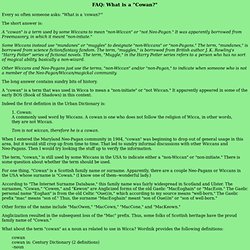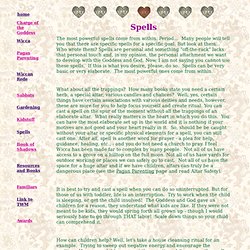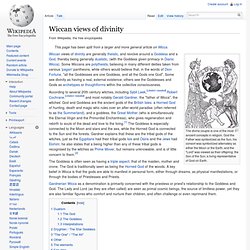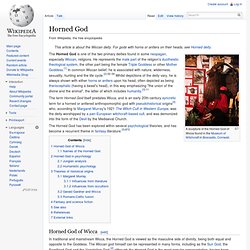

MagickTv's Channel. Silverravenwolf. Raising Witches: Teaching the Wiccan Faith to Children: Wicca & Witchcraft Books : Pentacle Press. What is a "Cowan?" FAQ: What is a "Cowan?

" Every so often someone asks: "What is a 'cowan? '" The short answer is: A "cowan" is a term used by some Wiccans to mean "non-Wiccan" or "not Neo-Pagan. " It was apparently borrowed from Freemasonry, in which it meant "non-intiate. " Some Wiccans instead use "mundanes" or "muggles" to designate "non-Wiccans" or "non-Pagans. " Other Wiccans and Neo-Pagans just use the terms, "non-Wiccan" and/or "non-Pagan," to indicate when someone who is not a member of the Neo-Pagan/Wiccan/magickal community. The long answer contains sundry bits of history. A "cowan" is a term that was used in Wicca to mean a "non-initiate" or "not Wiccan. " Indeed the first defintion in the Urban Dictionary is: 1.
When I entered the Maryland Neo-Pagan community in 1984, "cowan" was beginning to drop out of general usage in this area, but it would still crop up from time to time. The term, "cowan," is still used by some Wiccans in the USA to indicate either a "non-Wiccan" or "non-initiate. " Endnotes: Wiccan children. The Wiccan Mother. Spells The most powerful spells come from within.

Period... Many people will tell you that there are specific spells for a specific goal. But look at them... Who wrote them? What about all the trappings? It is best to try and cast a spell when you can do so uninterrupted. How can children help? Be careful about personal gain spells. Never cast a spell to hurt someone physically or physically! Never cast a spell for someone that could affect another. Get permission before casting a spell for another. Always thank the Goddess and God for listening. And remember, not all spells will work or work as desired. Wiccan views of divinity. The divine couple is one of the most ancient concepts in religion.

God the Father was symbolized as the Sun, his consort was symbolized alternately as either the Moon or the Earth, and the "Lord" was viewed as their offspring: the Son of the Sun; a living representative of God on Earth. Wiccan views of divinity are generally theistic, and revolve around a Goddess and a God, thereby being generally dualistic, (with the Goddess given primacy in Dianic Wicca). Some Wiccans are polytheists, believing in many different deities taken from various 'pagan' pantheons, while others would believe that, in the words of Dion Fortune, "all the Goddesses are one Goddess, and all the Gods one God".
Some see divinity as having a real, external existence; others see the Goddesses and Gods as archetypes or thoughtforms within the collective consciousness. Gardnerian Wicca as a denomination is primarily concerned with the priestess or priest's relationship to the Goddess and God. Dualism[edit] Horned God. The term Horned God itself predates Wicca, and is an early 20th-century syncretic term for a horned or antlered anthropomorphic god with pseudohistorical origins[4] who, according to Margaret Murray's 1921 The Witch-Cult in Western Europe, was the deity worshipped by a pan-European witchcraft-based cult, and was demonized into the form of the Devil by the Mediaeval Church.

The Horned God has been explored within several psychological theories, and has become a recurrent theme in fantasy literature.[5]:872 Horned God of Wicca[edit] For Wiccans, the Horned God is "the personification of the life force energy in animals and the wild"[6] and is associated with the wilderness, virility and the hunt.[7]:16 Doreen Valiente writes that the Horned God also carries the souls of the dead to the underworld.[8] In the name of the Lady of the Moon, and the Horned Lord of Death and Resurrection[12] Names of the Horned God[edit] Horned God in psychology[edit] Jungian analysis[edit] Humanistic psychology[edit]